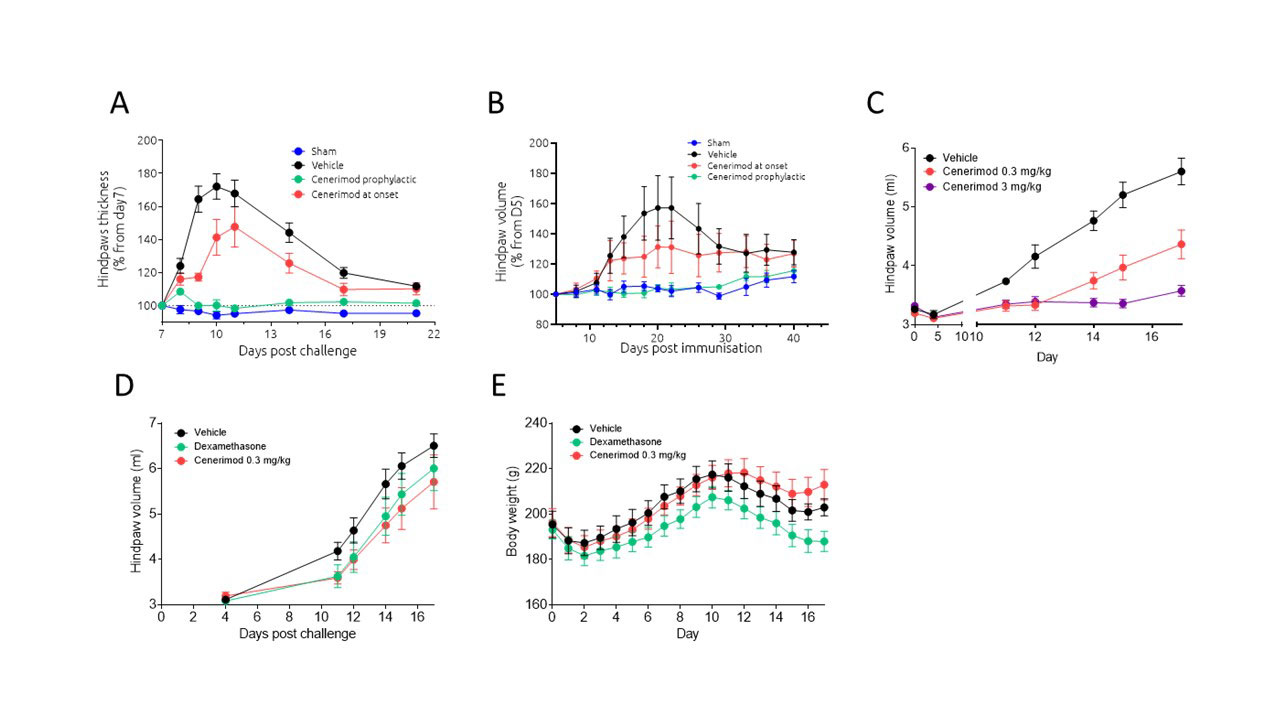Session Information
Date: Saturday, November 12, 2022
Title: RA – Animal Models Poster
Session Type: Poster Session A
Session Time: 1:00PM-3:00PM
Background/Purpose: Targeting the sphingosine-1-phosphate (S1P) pathway has become an attractive target for therapeutic intervention in autoimmune diseases due to its selective impact on the migration of T- and B lymphocytes from lymphoid organs to the periphery. Cenerimod, a selective S1P1 receptor modulator currently under investigation in a Phase IIb study (NCT03742037) in patients diagnosed with systemic lupus erythematosus (SLE), has shown efficacy in different preclinical models of rheumatic diseases including SLE, systemic sclerosis and Sjögren’s syndrome (1-3). In this study, we investigated the efficacy of cenerimod to inhibit or attenuate disease pathology in three murine preclinical models of rheumatoid arthritis (RA).
Methods: Joint swelling, autoantibody production, cellular infiltration and hematological parameters were measured in the antigen-induced arthritis (mBSA-RA), Pristane-induced arthritis (PIA), or adjuvant-induced arthritis (AIA) animal model.
Results: The treatment with cenerimod given as either prophylactic or therapeutic treatment regimen prevented or attenuated disease progression in multiple preclinical RA models. In the mBSA-RA mouse model, prophylactic treatment with cenerimod inhibited the acute inflammatory response post antigen challenge and prevented autoantibody formation, thus completely abrogating the initiation of the disease. Therapeutic treatment with cenerimod at the day of disease onset further showed a strong abrogation of joint inflammation (Fig. A). Similarly, in the rat PIA model, cenerimod treatment prevented disease development when given directly at initiation of disease, whereas treatment at day of disease onset limited further inflammation of the joints (Fig. B). Low dose corticosteroid treatment is frequently prescribed for rapid disease management in RA, yet its side effects do not allow chronic higher dosing for reaching full control of disease progression. In the rat AIA model, cenerimod treatment was able to prevent disease development dose-dependently (Fig. C). Further, low dose cenerimod was able to limit joint inflammation to the same extent as low dose corticosteroid treatment while not having a similar negative impact on body weight over the duration of the experiment (Fig. D & E).
Conclusion: The presented data suggest a pathological role for S1P signaling in murine arthritis since cenerimod treatment showed a highly beneficial effect in several preclinical RA models with translational value for rheumatological indications.
To cite this abstract in AMA style:
Hoyler T, Scherer J, Bulle M, Wyss C, Froidevaux S, Martinic M. Cenerimod, a Novel Selective S1P1 Receptor Modulator, Prevents or Attenuates Joint Inflammation in Several Preclinical Models of Rheumatoid Arthritis [abstract]. Arthritis Rheumatol. 2022; 74 (suppl 9). https://acrabstracts.org/abstract/cenerimod-a-novel-selective-s1p1-receptor-modulator-prevents-or-attenuates-joint-inflammation-in-several-preclinical-models-of-rheumatoid-arthritis/. Accessed .« Back to ACR Convergence 2022
ACR Meeting Abstracts - https://acrabstracts.org/abstract/cenerimod-a-novel-selective-s1p1-receptor-modulator-prevents-or-attenuates-joint-inflammation-in-several-preclinical-models-of-rheumatoid-arthritis/

